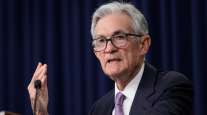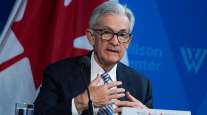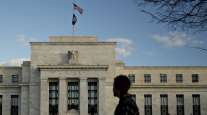Fed Cuts Rates by Quarter Point, Hints It May Be Done for Now

[Stay on top of transportation news: Get TTNews in your inbox.]
Federal Reserve officials reduced interest rates by a quarter-percentage point for the third time this year and hinted they may be done loosening monetary policy, at least for one meeting.
The Federal Open Market Committee altered language in its statement following the two-day meeting Wednesday, dropping its pledge to “act as appropriate to sustain the expansion,” while adding a promise to monitor data as it “assesses the appropriate path of the target range for the federal funds rate.”
As with the September statement, the FOMC cited the implications of global developments in deciding to lower the target range for the central bank’s benchmark rate to 1.5% to 1.75%.
Treasuries weakened on the Fed’s announcement, pushing the 10-year yield up briefly to 1.81% from 1.80%. Stocks were little changed and the U.S. dollar gained. Traders also pared wagers on a fourth consecutive rate cut in December.

The tweaks to the statement suggest policymakers are prepared to leave rates on hold for some time and assess the impact on the economy of their reductions over the past three meetings.
Chairman Jerome Powell has said that he didn’t expect an extended series of rate reductions, while describing easing as an effort to provide insurance for an aging economic expansion imperiled by trade tensions and faltering global growth. He hasn’t said, however, how much insurance is enough.
Trade Uncertainty
So far, the strategy appears to be working. While lower rates do little to combat the uncertain trade picture, unemployment has continued to drop, consumer spending has remained solid and lower mortgage rates have revived the housing market.
Hours before the decision, the Commerce Department reported the economy grew at a 1.9% annualized pace in the third quarter, beating estimates. The better-than-expected consumer spending was partly offset by weakness in business investment.
The Fed’s cuts also have calmed markets compared to the beginning of the year when investors grew nervous that monetary policy was too tight. Pricing in fed funds futures implies investors don’t fully expect another cut until well into 2020.
The same cannot be said for President Donald Trump, who has repeatedly attacked the Fed. He complained on Tuesday that it “doesn’t have a clue!” and has called on Powell to slash rates to zero while tweeting favorably about negative rates applied by central banks in Europe and Japan.
Dissenting Votes
As with the past two cuts, Kansas City Fed President Esther George and Boston’s Eric Rosengren dissented, preferring to keep rates unchanged.
The FOMC didn’t release a new set of economic forecasts and rate projections at this meeting, so it’s unclear how many non-voters on the committee also had penciled in a reduction.

The statement again highlighted the essentially positive condition of the U.S. economy. With unemployment at a half-century low, officials continued to describe the labor market as “strong,” job gains as “solid” and household spending as rising at a “strong pace.”
At the same time, they repeated a references to “uncertainties’’ in the economic outlook. Officials also made a minor change to say business fixed investment and exports “remain weak.” The prior statement had said that they had weakened.
Faltering Factories
That softness has shown up in data from the manufacturing sector this year, though factory output rose slightly in the third quarter. Fed officials have been watching for signs that weakness in manufacturing and faltering confidence in the business sector might threaten consumer spending, particularly if the job market cools. The Labor Department will release its October employment report on Friday.
Fed officials also noted that inflation was running below their 2% target and said “inflation expectations are little changed.”
Officials continued ordering the purchase of Treasury bills to boost bank reserves. The program, announced Oct. 11, is aimed at tamping down volatility in overnight funding markets by increasing the supply of cash available for short-term lending.
Emily Barrett, Ben Holland, Sophie Caronello and Vince Golle contributed to this report.
Want more news? Listen to today's daily briefing:




